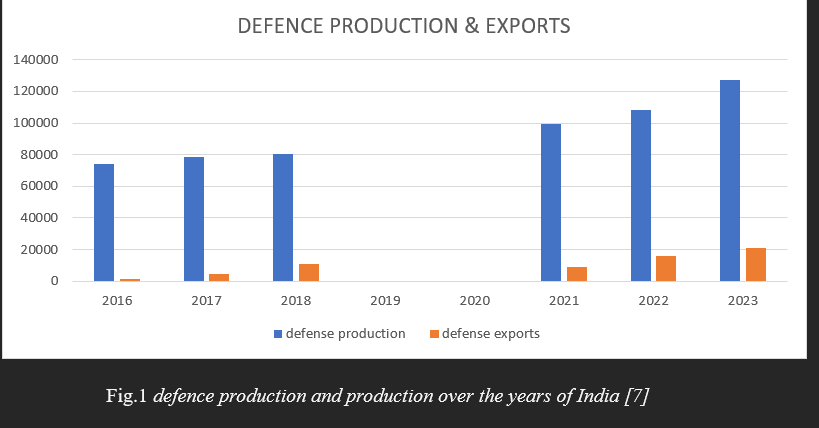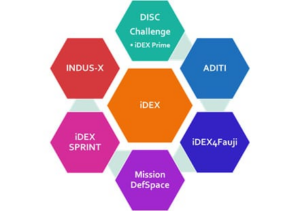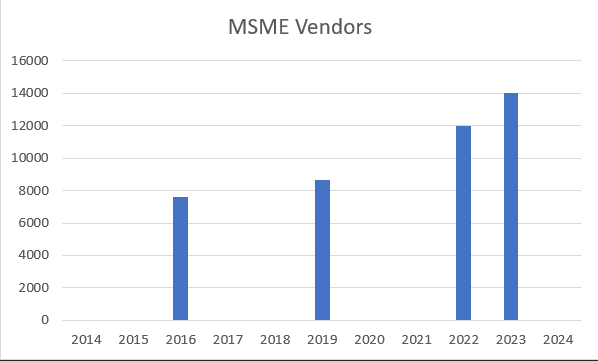Rawat, A., & Tyagi, K. (n.d.). FADING EMBERS: THE AFTERMATH OF AMBITIOUS DEFENCE ENDEAVORS.
ABSTRACT
The Micro, Small, and Medium Enterprises (MSME) sector is increasingly recognized for its potential to enhance India’s defence manufacturing capabilities. The Indian government has implemented various reforms to integrate MSMEs into the defence ecosystem, aiming for greater self-reliance and reduced import dependency. This paper analyses the numerical data surrounding these reforms, their implications, and the overall impact on India’s defence sector, while also highlighting the challenges faced by startups within this framework, including notable failures.
India’s defence sector has historically relied heavily on imports, with approximately 70% of its requirements being sourced from abroad. The reliance on foreign suppliers has raised concerns about national security and the sustainability of defence capabilities. In response, recent initiatives have set ambitious targets for indigenization, aiming for 70% of defence needs to be produced domestically under the “Make in India” initiative. This shift is not only about enhancing self-reliance but also about boosting domestic manufacturing and creating jobs. The defence production target is set at USD 25 billion and an export target of USD 5 billion[1] by 2025. The government’s strategy includes fostering a vibrant ecosystem for MSMEs, which are expected to play a pivotal role in achieving these goals. With approximately 8,000 MSMEs currently operating in the defence sector, their contribution is crucial for enhancing the supply chain and reducing dependency on imports.

Key Reforms and Numerical Data
- FDI Limit Increase: The Foreign Direct Investment (FDI) limit in the defence sector has been raised to 74% through the Automatic Route and up to 100% with government approval for companies bringing in modern technology[3]. This reform aims to attract foreign investment and expertise, which can be beneficial for local MSMEs seeking to enhance their technological capabilities.
- Defence Industrial Corridors (DICs): Two DICs have been established in Uttar Pradesh and Tamil Nadu, with investments of INR 1,135 crore in UP and INR 966 crore in TN as of May 2021[5]. These corridors aim to create a conducive environment for MSMEs by providing infrastructure support, facilitating research and development (R&D), and fostering collaboration between various stakeholders in the defence ecosystem.
- iDEX (Innovations for Defence Excellence) Initiative Launched in 2018 under the Ministry of Defence, iDEX provides a platform for MSMEs and startups to develop defence-related innovations[4].

Fig.2 programmes under iDEX [9]
It provides financial assistance and helps startups showcase their innovations directly to defence stakeholders.
- Budget Allocations: In FY24, the Indian government earmarked INR 1,500 crore specifically for startups and MSMEs within the defence procurement budget. This allocation is intended to encourage innovation and support new entrants in the market, allowing them to develop products that meet defence requirements.
- Current MSME Landscape: As of 2024, there are approximately 8,000 MSMEs operating in the defence sector, with a target to double this number in the coming years [4]. These enterprises contribute significantly to the defence supply chain by providing essential components and services ranging from electronics to advanced materials.

Fig 3 MSME vendors over time in defence sector
- Employment Generation: MSMEs in the defence sector directly employ around 200,000 people and indirectly support an additional 600,000 jobs, highlighting their role as a significant employment generator[1]. This job creation is vital for economic growth and stability within local communities.
- Economic Contribution: The MSME sector contributes about 8% to India’s GDP and accounts for approximately 45% of manufactured output and 40% of exports. The overall work executed in India’s defence sector is valued at around USD 18 billion, showcasing the vital role of MSMEs within this framework.
- Future Opportunities: The Indian defence sector is projected to hold ordering opportunities worth approximately USD 138 billion over the next decade. This projection emphasizes the significant potential for MSMEs to expand their footprint in this domain, particularly as new technologies such as artificial intelligence (AI), unmanned systems, and cybersecurity solutions gain prominence.
Challenges Faced by Startups
Despite favourable reforms, many startups in the defence sector have struggled or failed due to various challenges:
- High Failure Rate: Approximately 80-90% of startups fail within five years of inception across sectors in India[2]. This trend is mirrored in defence startups where complex acquisition processes and high entry barriers exist.
Defence startups in India encounter a range of significant challenges that hinder their growth and success. One of the major issues is dealing with unrealistic qualitative requirements set by the Indian armed forces. These standards are often stringent and can change during the development phase, making it challenging for startups, especially those with limited resources, to adapt quickly. Additionally, securing funding is a significant hurdle, as the defence sector is known for its high capital requirements and long project gestation periods. Investors tend to view defence ventures as risky, leading to a reluctance in providing necessary venture capital, even when startups present promising innovations.
Moreover, the procurement process within the defence sector is notoriously complex and opaque. Navigating this landscape can be difficult for startups, often resulting in delays or outright rejection of their proposals. The intense competition within the industry further exacerbates these issues. Many startups face substantial barriers to market entry, as established players in the defence sector typically dominate contracts, making it challenging for new entrants to secure business. Finally, the lack of commercial viability is another critical concern. Startups focusing solely on defence applications often struggle to commercialize their products outside of government contracts, limiting their growth potential and increasing the risk of failure if they cannot diversify their market appeal.
Notable Failures:
- Staqu Technologies: Initially focused on video analytics for security applications, Staqu faced difficulties penetrating the defence market despite attempts through iDEX (Innovations for Defence Excellence). The co-founder noted that navigating the application process was complicated and non-transparent; Staqu eventually pivoted away from defence applications[4].
- Skylark Labs: This company attempted to provide drone solutions but struggled with slow decision-making processes within Indian defence procurement. Although they secured some contracts through iDEX, they found it challenging to sell their commercialized products directly to armed forces.[6]
- Other startups like AjnaLens have also faced hurdles; while they won contracts for AR/VR solutions, their products remain stuck in lengthy field trials due to regulatory requirements.
- A significant issue noted across these startups is that only about 10% of agreements made through iDEX have resulted in material contracts, leading many firms to abandon their defence initiatives altogether.[7]
- Additionally, companies like Defence Innovators, which aimed at developing indigenous solutions for small arms manufacturing, faced challenges due to high capital requirements and regulatory hurdles that stifled innovation.
Factors Contributing to Startup Failures
Several systemic factors contribute to the high failure rate among startups attempting to engage with India’s defence sector:
- Complex Procurement Processes: The bureaucratic nature of defence procurement can deter smaller firms from engaging effectively with larger contracts. Startups often encounter lengthy approval processes that delay product deployment.
- Lack of Market Awareness: Many startups lack adequate understanding of market needs within the defence sector. Misalignment between product offerings and actual demand can lead to unsuccessful ventures.
- Funding Constraints: Despite government support programs like iDEX, many startups struggle with access to capital required for expansion and technological upgrades. The initial costs associated with R&D can be prohibitive without sufficient financial backing[8].
- Regulatory Challenges: Compliance with stringent regulatory requirements can be daunting for new entrants. Startups often find it challenging to navigate these regulations effectively without prior experience or established networks.
- Limited Networking Opportunities: Startups may lack access to key industry players or decision-makers within the defence establishment. Building relationships is crucial for securing contracts but can be difficult without established connections.
Recommendations for Further Action
To enhance the participation of MSMEs and startups in India’s defence sector, several measures should be considered[4]:
- Simplify Procurement Processes: Streamlining bureaucratic procedures can reduce entry barriers for smaller firms. A more transparent and efficient procurement process would encourage greater participation from startups.
- Enhance Funding Mechanisms: While initiatives like iDEX exist, access to capital remains a challenge for many startups. Establishing dedicated funds or grants specifically aimed at defence-related innovations could alleviate financial constraints.
- Improve Market Awareness: Providing better market insights to startups can help align their offerings with actual defence needs. Workshops or partnerships with established firms could facilitate knowledge transfer.
- Foster Networking Opportunities: Creating platforms for startups to connect with industry leaders and decision-makers within the defence establishment can help build essential relationships necessary for securing contracts.
- Support Regulatory Navigation: Offering guidance on compliance with regulatory requirements can help new entrants better navigate the complexities of the defence sector.
- Promote Collaboration Across Sectors: Encouraging partnerships between established defence firms and startups can lead to innovative solutions while providing startups with valuable experience and market access.
Contextual Data
The Indian defence production value surpassed ₹1 lakh crore (approximately $12 billion) for the first time in FY 2022-23, reaching ₹1,06,800 crore, marking a 12% increase from ₹95,000 crore in FY 2021-2212.
There has been a remarkable 200% increase in the issuance of defence licenses over the past 7-8 years, reflecting a growing integration of MSMEs and startups into the defence supply chain14.
Currently, around 14,000 MSMEs and 329 startups are engaged in defence production in India4. This participation is vital for achieving the government’s goal of increasing indigenous production to 70% of India’s defence needs under initiatives like ‘Make in India’ and ‘Atmanirbhar Bharat’ (self-reliant India)[4].
Implementing these recommendations can substantially enhance the role of MSMEs and startups in India’s defence sector, driving innovation and self-reliance while contributing to economic growth.
Conclusion
The reforms aimed at integrating MSMEs into India’s defence sector represent a critical shift towards achieving self-reliance in defence production. With substantial budget allocations and supportive policies, these initiatives enhance the capabilities of MSMEs while contributing positively to India’s overall defence preparedness. However, challenges remain evident through the high failure rates of startups attempting to navigate this complex landscape. To maximize the potential of MSMEs and startups within this vital sector, it is essential for policymakers to address existing challenges by simplifying procurement processes, enhancing funding mechanisms, providing better market insights, and fostering networking opportunities among industry players. Such measures would foster a robust ecosystem that promotes innovation while bolstering national security through self-reliant capabilities.
References
“Aerospace & Defence.” KPMG. Accessed November 21, 2024. [1]https://kpmg.com/in/en/home/industries/aerospace-and-defence.html.
Behera, Laxman Kumar. “India’s Defence Industry: Achievements and Challenges.” [2]https://www.orfonline.org/research/india-s-defence-industry-achievements-and-challenges.
“FDI IN DEFENCE SECTOR.” Press Information Bureau. Accessed November 21, 2024. [3]https://pib.gov.in/PressReleasePage.aspx?PRID=1654091.
Ghosh, Rwit. “Defence Startups Need To Look Past iDEX To Sustain Their Businesses.” NDTV Profit, September 13, 2024
[4]https://www.ndtvprofit.com/technology/defence-startups-need-to-look-past-idex-to-sustain-their-businesses.
Joshi, Keertivardhan. “MSMEs For Pushing Defence Indigenisation In India: Roadblocks And Recommendations.” Swarajya by Kovai Media Private Limited. Accessed November 21, 2024.
[5]https://swarajyamag.com/defence/msmes-for-pushing-defence-indigenisation-in-india-roadblocks-and-recommendations.
Philip, Snehesh Alex. “7 Big-Ticket ‘Make in India’ Defence Projects That Have Failed to Get off the Ground.” ThePrint, August 11, 2020.
[6]https://theprint.in/defence/7-big-ticket-make-in-india-defence-projects-that-have-failed-to-get-off-the-ground/479422/.
Singh, Angad. “Hits and Misses in Indian Defence Contracting.” orfonline.org, December 4, 2023.
[7]https://www.orfonline.org/expert-speak/hits-and-misses-in-indian-defence-contracting.
“Start-Ups That Failed within 5 Years of Starting in India and Why!” <h1>Start-ups that failed within 5 years of starting in India and why!</h1>. Accessed November 21, 2024.
[8]https://www.walmartvriddhi.org/start-ups-that-failed-within-5-years-of-starting-in-india-and-why.
Defence Startups Need To Look Past iDEX To Sustain Their Businesses [9]https://www.ndtvprofit.com/technology/defence-startups-need-to-look-past-idex-to-sustain-their-businesses






